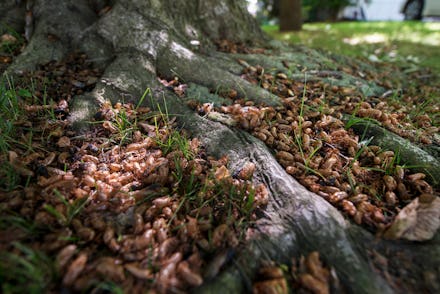Turns out we're due for a plague-level cicada infestation

It's only been a couple of weeks since the end of the Jewish holiday of Passover, which celebrates the ancient Israelites' exodus from slavery under the Egyptian pharaohs. It's a holiday which, among other things, traditionally features a somber recitation of the fabled 10 plagues that purportedly tormented the ancient Egyptians until their slave population was released from bondage. And although Passover is over, I can't help but think of the plagues — specifically, the ones having to do with innumerable insects wrecking havoc across the lands. Because, as it happens, we're due for a plague-level insect infestation of our own in just a few short weeks, dubbed "Brood X."
Brood X is a swarm of tens of billions of cicadas that is expected to emerge from its 17-year subterranean sleep cycle in stages across multiple central and eastern states, as soil temperatures approach the mid-60s, West Virginia University forest pathology and mycology professor Matt Kasson told The New York Times. And while Brood X (as in, the 10th brood among many) isn't the largest cicada swarm in terms of sheer numbers, it does cover the most area in the country, which means its effect on, well, everything will likely be the most widespread.
If you're having a hard time thinking back to those halcyon days of 2004, when Brood X last emerged, allow me to give you a little preview of what we're in for: billions of inches-long, red-eyed bugs, buzzing at ear-bleed levels (they've been known to clock upwards of 90 decibels) for a month and a half or so, before their nymphs are born and begin the 17-year cycle all over again. See ya in 2038!
They're not exactly harmful to humans — no bites or stings or diseases, or massive crop destruction — and can even be eaten, if that's your sort of thing. But the emergency of billions of decidedly big bugs is hardly the sort of thing that slips beneath the radar undetected. In addition to the cacophony of insectoid buzzing that comes with a cicada emergence, there's also the fact that soon thereafter, the ground will be littered with corpses as this generation completes its lifecycle and goes off to that big bug party in the sky. That, in turn, could fuel a massive population boom among some of the insects' natural predators, such as birds.
So, to recap:
- Billions of bugs waking up after almost two decades underground.
- Ear-splitting buzzing from males looking for a once in a lifetime mating opportunity.
- Babies!
- Billions of bugs dropping dead after almost two decades underground.
- So many birds!
- Do it all over again in 17 years.
This is, I suppose, one of the purest, most unambiguous examples of the great circle of life in which we all are bound. But also, it's a great reminder that while we might be the most advanced species on this planet, we're got a long ways to go before we can match the biblical size and scale of our humble insect overlords.